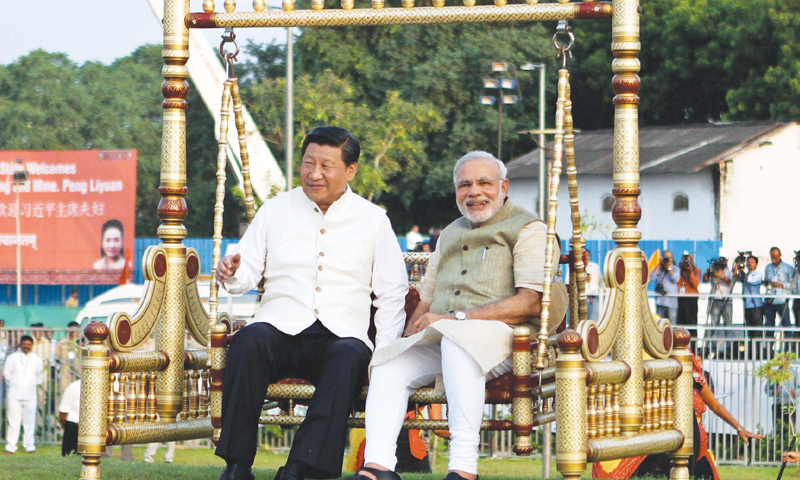AHMEDABAD: India’s prime minister rolled out the red carpet for Xi Jinping in his hometown on Wednesday, as the Chinese president began his maiden visit, with Asia’s rival superpowers seeking to reset relations.
Narendra Modi pulled out all the stops for Mr Xi, organising an intimate riverside dinner in Ahmedabad, where giant billboards in Chinese, Gujarati and English welcomed the president.
With both sides eager to emphasise cooperation over competition, Mr Xi said in an article published on Wednesday “the world’s factory and the world’s back office” made a winning combination, welcoming Indian businesses to China and pledging vital funding for infrastructure development.
President Xi will hold official talks on Thursday with Mr Modi and his Indian counterpart Pranab Mukherjee when the two sides will sign a string of agreements expected to include those on nuclear cooperation.
The neighbours are expected to sign a string of agreements, including those on nuclear cooperation
Wednesday’s agenda was informal, including a visit to the former hermitage of Indian independence hero Mahatma Gandhi and a riverside stroll. Mr Modi escorted Mr Xi through a photo exhibition on Gandhi’s life.
After the private dinner with Mr Modi, who celebrated his 64th birthday on Wednesday, President Xi was headed for New Delhi.
Despite his hardline nationalist reputation, Mr Modi moved quickly to engage with China after being elected in May on a pledge to revive India’s flagging economy, which experts say has been held back by weak infrastructure.
But Mr Modi has also made it clear he will pursue a more muscular foreign policy than the previous centre-left Congress government.
During his election campaign, he said China would have to shed what he called its “expansionist mindset”, although he also spoke admiringly of China’s economic success.
The two neighbours, now nuclear-armed, fought a brief, bloody war in 1962 over the eastern Indian state of Arunachal Pradesh and are still embroiled in a bitter dispute over the territory.
Border issues are on the agenda for the visit of Mr Xi, who is accompanied by his wife Peng Liyuan. But both sides say they want to focus on economic cooperation, with India seeking Chinese funding for an overhaul of its dilapidated railways and cooperation in nuclear energy.
“China-India relations have become one of the most dynamic and promising bilateral relations in the 21st century,” wrote President Xi in the article in The Hindu daily.
China is India’s biggest trading partner, with annual two-way commerce of more than $65 billion. But the trade deficit with China has soared to over $40bn from $1bn in 2001-02, Indian data shows.
Experts said China would seek to allay Indian concerns over the widening deficit as it tried to cement its relationship with its western neighbour at a time of heightened tensions with Japan and several Southeast Asian nations over disputed sea territory.
Mr Modi enjoys a close relationship with Japan’s President Shinzo Abe, and analysts say he may be able to leverage Beijing’s rivalry with Tokyo to secure Chinese investment.
China’s consul-general in Mumbai Liu Youfa told the Times of India before the visit that Mr Xi would “commit investments of over $100bn”, noting this was triple the sum pledged by Japan during Mr Modi’s visit earlier this month.
Meanwhile, India and China signed several agreements on Wednesday, including one to set up a Chinese-backed industrial park in Gujarat.
Indian and Chinese companies, meanwhile, inked 24 preliminary deals worth $3.43bn in sectors from aircraft leasing to telecom.
President Xi headed to India after visiting the Maldives and Sri Lanka. He launched construction of a $1.4-billion port city in Sri Lanka’s capital, underscoring Beijing’s growing foothold in the Indian Ocean region.
Published in Dawn, September 18th, 2014


































